Page added on May 19, 2017
Confounding Collapse
“As brilliant as your conceptual breakthrough may be, there is no escaping your cultural milieu.”
The Paris Agreement calls for deep decarbonization by 2050 (net neutrality) and drawdown of all the legacy carbon thereafter, returning humans to the comfortable Holocene from which we evolved.
A recent study by Energy Innovation Reform Project (a pro-nuclear, pro-coal think tank), reviewing the now extensive literature on the renewable energy transition, concluded that a 100% renewables goal, while technically feasible, still faces many challenges:
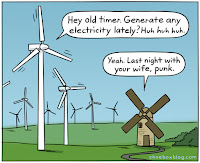 To achieve Paris policy goals — by no means an assurance that climate catastrophe will be averted — power sector CO2 emissions must fall to zero by 2050. The pressure of this timeline is itself disruptive. Decarbonization is significantly — exponentially — more difficult than mere emissions reductions, even if it loses the baggage of that Dogberry neologism (“decarbonization”).
To achieve Paris policy goals — by no means an assurance that climate catastrophe will be averted — power sector CO2 emissions must fall to zero by 2050. The pressure of this timeline is itself disruptive. Decarbonization is significantly — exponentially — more difficult than mere emissions reductions, even if it loses the baggage of that Dogberry neologism (“decarbonization”).
- Renewables are primarily delivered by electricity, and to a lesser extent by liquid or pelletized biofuels. To abate carbon, there needs to be a shift to electricity for transportation, heating, and industrial energy.
- Power generation systems involving renewables such as wind and solar are physically larger, requiring more land area.
- Wind and solar require much greater total installed capacity — 3 to 6 times peak demand — to offset their intermittency.
- Stable electric grids require a mix of “dispatchable” energy (variable generation on demand) and long-duration (seasonal) energy.
- Battery storage is infeasible for long duration storage. In the USA, for instance, you would need 37.8 billion Tesla Power Wall 2.0 home energy storage systems—or 320 Power Walls per household to sustain present power consumption.
- Biofuel backup, the most practical form of seasonal storage, would entail converting some fraction of Earth’s photosynthetic capacity to supplying electricity while somehow maintaining the other essential functions that natural ecosystems supply. You can’t rob Peter (Rabbit) to PayPal.
When one considers that the so-called industrial revolution was fueled by a switch from energy-light whale oil and firewood to energy-dense petroleum and coal — enabling expansion of human population from 1 billion to 7 billion — reversion to some sort of status quo ante is a daunting prospect. To start with, where will you find the whales?
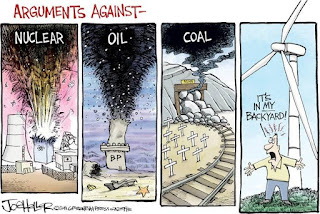 Even if new generations of solar cells can take the place of whales in lighting homes, it is questionable whether those can provide the kinds of surplus energy that enabled construction of the world’s megacities, airborne armies, or space programs capable of landing men on the Moon or operating satellite-based Cloud technologies.
Even if new generations of solar cells can take the place of whales in lighting homes, it is questionable whether those can provide the kinds of surplus energy that enabled construction of the world’s megacities, airborne armies, or space programs capable of landing men on the Moon or operating satellite-based Cloud technologies.
Humans now propose to switch from dependency on Earth’s 650-million-year-old savings account of fossil sunlight to a much more modest daily ration of photons arriving from the Sun. To do so, they must first gather and store those photons or their effects (e.g.: wind, tides, radiant heat, growing things) and then dispense them in some fashion similar to their previously accustomed habits for using oil or coal. They must finance all that while under the pressure of economic decline and mounting climate catastrophes. And they must overcome the problems of intermittentcy, diffusion and storage.
 |
| Consumer optimism is at a 17 year high — no worries, invest! |
These are not small challenges. To suggest that we can supply a consumerist economy elevated to the scale of 7 billion — soon-to-be 12 billion as the pent-up demographic time bomb explodes — from silicon wafers, neodymium turbines, or terrestrial and marine vegetation, seems deluded.
Nonetheless, most governments, and all the major international development banks, now have the scare in them. Typical is the InterAmerican Development Bank, whose 2017 portfolio is 80% mitigation ($2.127 billion) and 20% adaptation (562 million). Mitigation refers to efforts to reduce or limit fossil emissions, or to a lesser extent, to drawdown and sequester greenhouse gases. Adaptation refers to efforts to reduce or limit vulnerability by restructuring shelter, food and water security around the new normal.
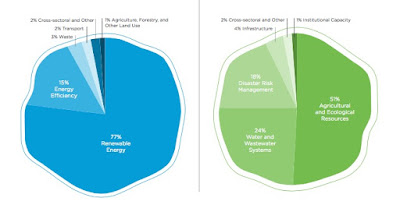 IDB’s 2016 report warned its client countries that 60 to 80 percent of publicly listed fossil fuel reserves “are unburnable if the world is to avoid disastrous climate change.” Worse, they broke it to them that their agriculture systems, tourist industries, and most of the jobs they have created to productively employ their workforce over the past century of industrialization are all stranded too. IDB would now seem to agree with James Howard Kunstler that Robert Moses‘ utopian vision of America as happy-motoring affluent suburbia was the worst misallocation of resources in human history.
IDB’s 2016 report warned its client countries that 60 to 80 percent of publicly listed fossil fuel reserves “are unburnable if the world is to avoid disastrous climate change.” Worse, they broke it to them that their agriculture systems, tourist industries, and most of the jobs they have created to productively employ their workforce over the past century of industrialization are all stranded too. IDB would now seem to agree with James Howard Kunstler that Robert Moses‘ utopian vision of America as happy-motoring affluent suburbia was the worst misallocation of resources in human history.
As brilliant as your conceptual breakthrough may be, there is no escaping your cultural milieu.
 What we might call civilization, historian Joseph Tainter recast as something more nuanced: complexity. In his 1988 classic, The Collapse of Complex Societies, Tainter did not attribute the rise of the Greek, Mayan or the Roman Empires to military conquest, slavery or some new form of energy. He said that complexity creates resources just as resources create complexity. The binding energy is social organization.
What we might call civilization, historian Joseph Tainter recast as something more nuanced: complexity. In his 1988 classic, The Collapse of Complex Societies, Tainter did not attribute the rise of the Greek, Mayan or the Roman Empires to military conquest, slavery or some new form of energy. He said that complexity creates resources just as resources create complexity. The binding energy is social organization.
A corollary of that is that depletion of resources does not necessary doom a civilization, even one that has been sawing off the tree limb it is perched upon. Rather, Tainter said, what is experienced in the periodic arrival of collapse is the normal and routine feedback of complexity.
Endlessly iterating intermediation as a society complexifies places greater demands on resources while yielding diminishing returns, both energetically and in terms of social benefit. Think of the store in the mall that only sells baseball caps. It is highly specialized. The store’s owner, who probably pays a franchise fee, requires a trained sales force, working probably at minimum wage but with health and unemployment insurance; rent to the mall owner; store liability, fire and theft insurance; advertising; payroll accountant; tax accountant; inventory depreciation; and more. The store management has a long list of complex regulations it has to abide by.
 At the same time, its business model is very fragile. Success depends on people having discretionary income to buy new baseball caps. It is predicated on a demand adequate to meet the overhead of the store and avoid insolvency. It assumes people will continue to drive from some distance away to shop at the mall. It assumes that the costs to light, heat, cool and secure the mall will not become so prohibitive that the mall closes.
At the same time, its business model is very fragile. Success depends on people having discretionary income to buy new baseball caps. It is predicated on a demand adequate to meet the overhead of the store and avoid insolvency. It assumes people will continue to drive from some distance away to shop at the mall. It assumes that the costs to light, heat, cool and secure the mall will not become so prohibitive that the mall closes.
Today it is not just that business model that is too fragile. Its the entire global consumer economy. The signs are all around us. The collapse phase of the civilizational cycle is here. Two distinguishing features of this one are that it is global in scope for the first time and that it is capable of being watched in real time by nearly everyone.
In a recent interview with Steve Keen, Michael Hudson described the plight of the average US city dweller in 2017:
Hudson: Let’s say that debt is equal to 100% of GDP, which it is, at least in almost every country. Now, if countries are only growing at 1%, then if you pay interest at usually 5%, a country would have to grow 5% per year — the GDP — just to pay the interest. And if countries are growing at 1%, and the interest rate for average that everybody pays, about 5% or 6%, then you’re going to have the actual economy shrinking every year as there’s this siphoning off of interest. That’s what debt deflation is.
And that’s the situation that England is in. That is turning Eurozone into a dead zone. And it’s the situation of the US economy. That all of the surplus is paid for interest — not to mention financial returns, capital gains, and economic rent to the landlord class and to the monopolies.
So no wonder the economy is shrinking. Nobody has enough money to buy what they produce anymore. So that’s why there are so many vacancies in storefronts in New York. Why stores are going out of business. Restaurants are going out of business. There’s a squeeze on.
Keen: Yeah. Can you – is that palpable in the States? Because in England it’s not quite so palpable.
Hudson: Well, just imagine the average paycheck. I don’t know if it’s similar. In the United States, the big chunk off the top of every paycheck is for housing. Now in America almost all mortgages — 85% of mortgages are guaranteed by the government and banks will write a mortgage up to the limit of 43% of your total income.
So imagine, here’s a family that in order to have a home is either paying 43% of its income on a mortgage, or it’s paying that in rent. The average rent in New York City is $4,500 a month. Well, you can imagine if the average salary is about $80,000, do the math for yourself. [$54000 or 67.5%]
Now in addition to that, people have to pay maybe 10% more of their income to the banks for credit card debt, student loans, auto debt. And then also taken off the front of every paycheck is 15% of a forced saving of social security and medical care. So that’s taken off. And there’s about another 15% recombination of state and local and federal income taxes. And then you have the value-added taxes. So you add all that up. To the 43%, to 10% to the banks, maybe the 25% for taxes, you have only about 25% of the average paycheck that’s available to be spent on goods and services.
Now think of the circular flow. The whole of economics was founded by a doctor, Francois Quesnay in France, that looked at a national income like the circulation of blood in the body. But you have this blood being drained — 75% of the circular flow now is drained for what we call the FIRE sector – finance, insurance, and real estate.
It is when progressively increasing complexity goes past the point of net energetic loss and starts to drain blood that hooded figures bearing scythes appear.
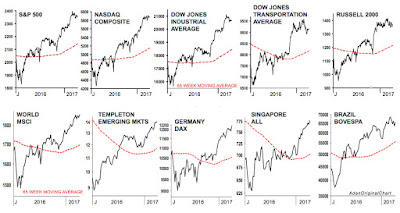 |
| Buoyed by low energy prices and buyer confidence the markets keep climbing |
Exceeding biophysical limits may not be the proximate cause of collapse, assuming Tainter is correct, but the societal response to the encounter is critical. The Collapse of Complex Civilizations does not ask why a society would be utterly unable to change course, even in the face of imminent disaster, but it begs that question. Is our social inertia so hard wired? Are homo that un-sapien?
In her inside look at the Federal Reserve, Fed Up: An Insider’s Take on Why the Federal Reserve is Bad for America, Danielle DiMartino Booth depicts the bank presidents who make up that board as nervous engineers, clinging to unproductive Keynesian stimuli in a desperate effort to re-track the train after it has derailed.
Since the 2008 crisis the Fed, along with the European, Chinese, Japanese and every other central bank, have racked up mountainous debt, with inflationary effects hidden only by the much-derided income gap whereby the super-rich take money out of circulation nearly as quickly as it is created. To the cabal of economists who haunt the halls of the central banks, the modern tools of money manipulation have gotten so good that economic growth is forever assured. DiMartino Booth, David Stockman, Nicole Foss, Max Keiser and many others believe a reckoning is long overdue.
The shape of the descent will not resemble the shape of the ascent — a smooth bell curve — because of the Seneca trap. The more you employ artifice to extend the peak, the steeper the downslide that comes when you can no longer pretend to extend.
With the crash of fossil fuel production, already well along and scraping the barrel for the dirty, tarry scraps, greenhouse gas emissions may decline much faster than they grew up, which is good news. Of course, so will world GDP, and with it, food supply, consumer goods and, inexorably, population. This is not going to be pretty.
The economic earthquake that pundits warn is coming might keep us within a hospitable climate a while longer, but it will only slow the exit from that normalcy, not return it.
 Eventually, and with absolute certainty now, we will arrive at both the collapse of the global economy and runaway climate change, the two of them feeding off each other the way crumbling empires eat their seed corn.
Eventually, and with absolute certainty now, we will arrive at both the collapse of the global economy and runaway climate change, the two of them feeding off each other the way crumbling empires eat their seed corn.
In a number of those historic collapse events, rapid-onset climate change was the triggering event. The gun — mass psychosis — was cocked and loaded.
Since the problem is overcomplexity, what we really need is reversion to simpler ways to live. We need degrowth and depopulation; relocalization and transition; antifragility and mutually assured security.
When we described our cool lab concept we gave the example of a rural village in Haiti. While cities pose more of a challenge, we showed in the example of Los Angeles Eco-Village that it is possible to accomplish the required change anywhere and everywhere.
What we most need next are the vehicles — the change agencies, accellerants, and transformation catalysts. For those we will need to open the tool chest of social inventions.
22 Comments on "Confounding Collapse"

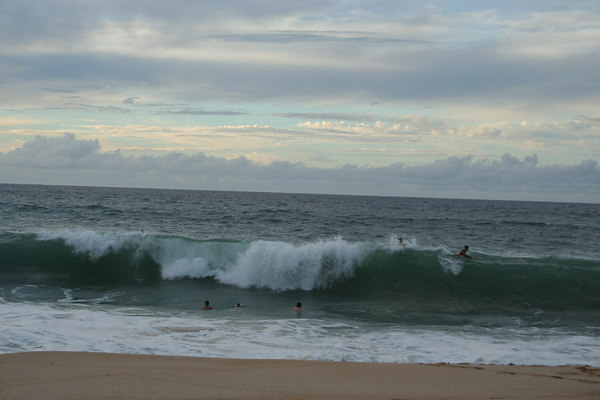


onlooker on Fri, 19th May 2017 2:28 pm
Our predicament as it were has no solution. We are staring down the barrel of ecological devastation. It is no longer how can we adapt. It is about the demise of the life support systems. I have become convinced of this. This is totally beyond our control now. Especially climate change now stands poised to bring an irreversible decline in the capacity for this planet to host much of the life it currently does. Nothing we can do now.
Dave Thompson on Fri, 19th May 2017 2:50 pm
OH MY YASSS onlooker
Apneaman on Fri, 19th May 2017 3:00 pm
Florida’s Bone Dry and Burning While Rest of U.S. Is Soaking Wet
-Wildfires hit Georgia too as rain stays away from both states
-Drought now may mean more hurricanes and tropical storms later
“Spring dumped so much rain on the U.S. that most of the country is drought-free for the first time in decades. But in parched Florida and Georgia, wildfires have destroyed hundreds of thousands of acres of forests and pastureland.”
https://www.bloomberg.com/news/articles/2017-05-19/florida-s-bone-dry-and-burning-while-rest-of-u-s-is-soaking-wet
Apneaman on Fri, 19th May 2017 3:02 pm
LMAO – thanks humans
The Arctic Doomsday Seed Vault Flooded. Thanks, Global Warming
“It was designed as an impregnable deep-freeze to protect the world’s most precious seeds from any global disaster and ensure humanity’s food supply forever. But the Global Seed Vault, buried in a mountain deep inside the Arctic circle, has been breached after global warming produced extraordinary temperatures over the winter, sending meltwater gushing into the entrance tunnel.”
https://www.wired.com/2017/05/arctic-doomsday-seed-vault-flooded-thanks-global-warming
onlooker on Fri, 19th May 2017 3:05 pm
AP, is documenting quite well our no solution predicament
onlooker on Fri, 19th May 2017 4:31 pm
Ah, so the the Doomsday vault didn’t anticipate probably the worse doom ie. climate change. Good to know our species is so clever Not
Davy on Fri, 19th May 2017 5:15 pm
Onlooker, I feel currently it is uncertain on the when and how but with the clarification we are in it now. Before we were in the pre phase change period before for example ice turns to water. Now the ice is melting and All kinds of unknows are surfacing. This appears to be happening abruptly and likely will continue in dramatic change. How this unfolds for us little individual humans in our small little locals is hard to gauge. Some places may actually do better before it gets bad. I can’t imagine this ending well for the world but the timing is still uncertain and the effects variable. The kicker is it is worse than we once thought yet, the decline may stabilize. It is a fascinating study.
onlooker on Fri, 19th May 2017 5:35 pm
Davy, I do not like to sound like I am so certain, it goes against my nature. However, being immersed now for years in all this leaves little room for doubt in my mind. The nail in the coffin is climate change for it is a planet changer. That is what the ice core and paleolithic record attest too. Most if not all of the mass extinctions on this planet involved climate change and now we are talking about CC on steroids given the speed by which this is occurring. Leaves little time for adaptation. And that is on top of other serious environmental degradation. And we are not done yet. 7 1/2 billion and growing and showing no signs that we will voluntarily give up consuming and using FF
Apneaman on Fri, 19th May 2017 6:19 pm
onlooker, thanks fur saying.
Stay Frosty, bro.
makati1 on Fri, 19th May 2017 6:28 pm
Climate change deniers live in their own little dream world along with the techies. Maybe, if you are under 20 and no education, you can be excused in your denial, but those who have experienced “climate” for decades can see the changes. The weather in Pennsylvania has has so many drastic swings this year alone to wake even the most sleepy observer to the change. 90F in mid May! Not in my 72+ years. That is July/August weather there. We are experiencing the blow-back from our stupidity. A million “what if” and “maybe” articles are NOT going to save us. The end is set and fast approaching. Buckle up!
Apneaman on Fri, 19th May 2017 6:40 pm
Consumer optimism. HA! It took an entire stale of econ 101 to come up with a bullshit metric like that.
Definition of optimism
1: a doctrine that this world is the best possible world
2: an inclination to put the most favorable construction upon actions and events or to anticipate the best possible outcome expressed optimism about the future of the business the optimism of cheerleaders
optimisticplay \ˌäp-tə-ˈmi-stik\ adjective
IOW Hope. An emotion. Sounds real scientific.
I can’t wait for next week when the “Consumer Pessimism” numbers come out.
Week after that it’s “Consumer Boredom” stats, followed by “Consumer Anxiety”.
A different consumer emotion every week, cause economics is a hard science just like physics N stuff.
onlooker on Fri, 19th May 2017 6:45 pm
I hear you Mak,check out what is happening in N.EAST US
https://www.usnews.com/news/best-states/connecticut/articles/2017-05-18/early-heat-wave-breaking-records-in-northeast-us-cities
Apneaman on Fri, 19th May 2017 6:48 pm
“It may well be one of the first epidemics because of global warming” : Climate Change Major Factor In Turning Dehydration Into A Deadly Disease
“Researchers currently classify the new form of chronic kidney disease as ‘climate-sensitive’, which means that climate is one ingredient contributing to the epidemic. As temperatures continue to rise, many such climate-sensitive diseases will become climate-driven, and monitoring and bringing attention to them will become even more crucial.” –Jane Palmer
“Mmm. Chronic kidney disease, brought on by dehydration and re-hydration with sugary drinks and not water. Look for this epidemic to propagate as temperatures rise.”
https://theoldspeakjournal.wordpress.com/2017/05/19/it-may-well-be-one-of-the-first-epidemics-because-of-global-warming-climate-change-major-factor-in-turning-dehydration-into-a-deadly-disease/
Davy on Fri, 19th May 2017 7:00 pm
Onlooker, I am not disagreeing I am just saying there is too much that is unknown to say how and when accurately and confidently. I am not saying the how and when is not happening now. Saying definitely it will be worse or better and when is reaching. In fact it has been worse than they thought and maybe it will be less bad before it gets much worse. This is what I am saying. I am a Guy McPherson type just not sold that all we have is 10 years. He is too defining for me but his doom is certainly well supported. This could drag or cascade out of control. We likely will not know until it is really bad. This is especially true because humans discount bad news significantly.
DerHundistlos on Fri, 19th May 2017 11:44 pm
Thank you, Davy for your comment. I have noticed and I am trying to emulate your example. We have far more in common then not. I enjoy learning from you and you definitely have a gift for prose.
DerHundistlos on Fri, 19th May 2017 11:46 pm
Davy, i.e. your 7:05PM posting.
Davy on Sat, 20th May 2017 6:23 am
I am a doomer. I am not an expert on many things. As a generalist and doomer what I try to do is incorporate doom into the discussion. In my personal world the discussion is by example. I do not talk about these things much because the so called “normal” people think you are a lunatic. Even here with many enlightened people they consider me a lunatic. That tells me I am on to something because civilization is insane so if you are considered insane then you are on to the truth. We are in a time of paradoxes where right is wrong and wrong is right. The timeless moral are still the same it is the existential ones that are now paradoxical. We are passing through a gate to a new world that is a shift in consciousness of growth to decline.
I try to do doom constructively. I do not want doom. I am looking for solutions but honest science is telling me there are none. Doom is my response to the truth of destructive change. I am yielding to the truth not my emotions. My emotions say I want people to be happy and comfortable. Maybe some of you are feeling the doom too and that is why some of you are relating to my comments.
I am nothing special I am just an oddity because there are so few real doomers that live it. I talk the walk with a doomstead and a doom way of life. I comment on this way of life for those who may show interest. My efforts are not going to make a difference to society. I am useless in this regards. Where I can make a difference is with some who find meaning in it. I am not going to change the world because the world is fated to end as we know it. Nothing and no one will change this powerful gradient of planetary change.
Where change can occur is from within. Once this change has occurred within then the enlightened and awakened can go forth with random acts of kindness to our fellow man and most importantly nature. Nature is our mother and showing our mother respect should be the highest form of awakening. This is not transcendence because we are fated to suffer in a painful future like all the rest. It is a transformation of living to the best it gets which is all there is. This is humility in honesty.
Midnight Oil on Sat, 20th May 2017 10:16 am
Another reason why prepping is just a waste of time
http://www.inquisitr.com/4230985/doomsday-seed-vault-floods-as-record-highs-melts-permafrost/
When it was constructed, the Global Seed Vault was embedded deep into the arctic permafrost and placed 130 meters into the rock and 130 meters above sea level. The permafrost combined with the high latitude was designed to help keep the facility at a constant three to four degrees Celsius below zero, making the cooling of the facility easier.
Unfortunately, a record heatwave in the Arctic that was part of the world’s hottest year on record melted the permafrost that surrounded the vault, sending a flood of meltwater into the 100-meter long entrance tunnel. When the vault was designed, the thick layer of permafrost and rock were meant to ensure that the seed samples would be protected from both man-made and natural disasters. Additionally, at a time when there is usually snowfall, the warmer temperatures created heavy rains, making the problem that much worse.
Apneaman on Sat, 20th May 2017 7:02 pm
Heat wave claims 17 lives in 48 hours in State
http://www.thehindu.com/todays-paper/heat-wave-claims-17-lives-in-48-hours/article18498643.ece
Apneaman on Sat, 20th May 2017 7:04 pm
Early heat wave shattering records
http://www.texarkanagazette.com/news/national/story/2017/may/19/early-heat-wave-shattering-records/674632/
Apneaman on Sat, 20th May 2017 7:05 pm
“A 2015 study of heatwaves in China revealed that the number of deaths due to excess heat had increased by a factor of 20 between the last decade of the 20th century and the first decade of this one.”
http://www.aljazeera.com/news/2017/05/heatwave-grips-northern-china-170519071621931.html
Apneaman on Sat, 20th May 2017 7:34 pm
Midnight O, I saw that yesterday – even posted a link too. Just came across this follow up.
The Doomsday Vault Isn’t Flooded But We’re All Still Going to Die
“Popular Science spoke with Cary Fowler, one of the creators of the vault to see just how serious the situation really is. “Flooding is probably not quite the right word to use in this case,” he told them. According to Fowler, a little bit of water has made its way into the entrance every year. Though he wasn’t present at the vault when the ‘flooding’ occurred this year, he insists that it’s a pretty routine occurrence.”
http://gizmodo.com/the-doomsday-vault-isnt-flooded-but-were-all-still-goin-1795400407
Of course the idea of a seed vault is fucking ridiculous to begin with. To what end? So a few tumors can survive and reinfect whats left? We gonna start anew – rebuild the Cancer! It’s just a secular Noah’s Ark fantasy [“Borrowed” from Epic of Gilgamesh].